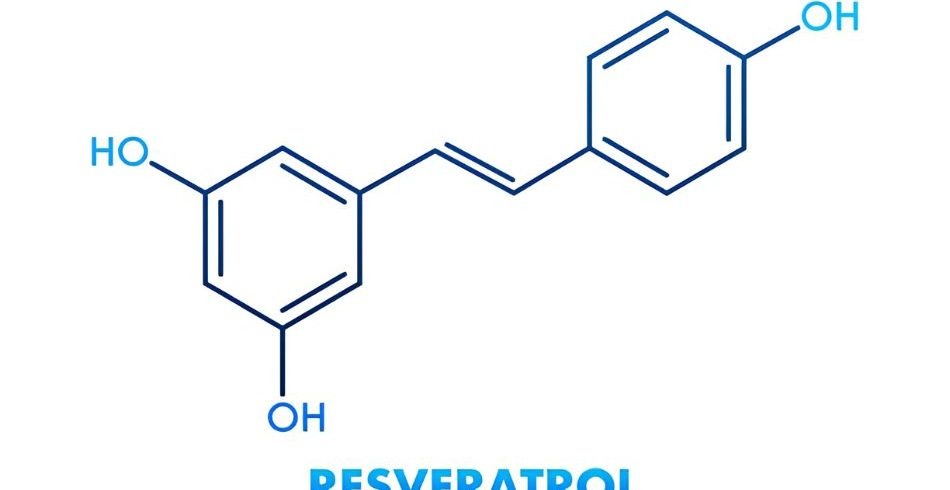
Resveratrol has garnered significant attention as a potential “miracle molecule” with promises of improving heart health, enhancing cognitive function, and even extending lifespan. Found predominantly in red wine, this compound has been the subject of numerous studies aiming to unravel its true impact on human health. But how much of this is backed by science, and how much is mere hype? In this deep dive, we’ll explore resveratrol health benefits from multiple perspectives, examining the latest research to provide a balanced, evidence-based understanding of its potential and limitations.
What is Resveratrol?
Chemical nature and forms
Resveratrol is a naturally occurring polyphenolic compound belonging to a class of stilbenes. It exists in two geometric isomers:
- Trans-resveratrol: The biologically active form that has been extensively studied for its health benefits.
- Cis-resveratrol: Less stable and less studied due to its lower biological activity.
Natural sources
Resveratrol is synthesized by plants as a defense mechanism against environmental stressors like pathogens and UV radiation. Key sources include:
- Red Grapes and Wine: Concentrated in the skin of red grapes. Red wine, produced by fermenting grape skins, contains higher levels than white wine.
- Berries: Blueberries, cranberries, mulberries, and bilberries provide the extract, contributing to their antioxidant properties.
- Peanuts and Pistachios: Nuts like peanuts (especially boiled peanuts) and pistachios contain measurable amounts of resveratrol.
- Japanese Knotweed (Polygonum cuspidatum): A plant rich in this extract, often used in dietary supplements due to its high concentration.

Resveratrol supplements
Resveratrol supplements are typically derived from Japanese knotweed extract or grape extracts. They come in various forms:
- Pure Trans-Resveratrol: Offers the most potent biological activity.
- Resveratrol Blends: Combined with other polyphenols or compounds to enhance absorption and efficacy.
- Bioenhanced Formulations: Include technologies like nanoparticles or liposomal encapsulation to improve bioavailability.
The science behind Resveratrol health benefits: mechanisms of action
Understanding how it works at the molecular level is crucial for evaluating its potential health benefits of resveratrol.
Activation of sirtuins
One of the most studied mechanisms is resveratrol’s ability to activate sirtuins, particularly SIRT1, a family of NAD⁺-dependent deacetylases involved in cellular regulation.
- Longevity Genes: Sirtuins are often referred to as “longevity genes” because they mimic the effects of calorie restriction, a known method for extending lifespan in various organisms.
- Cellular Processes: Activation of SIRT1 influences DNA repair, gene expression, mitochondrial function, and metabolic regulation.
Antioxidant properties
Resveratrol exhibits potent antioxidant activity, scavenging free radicals and upregulating endogenous antioxidant enzymes like superoxide dismutase (SOD).
- Oxidative Stress Reduction: By neutralizing reactive oxygen species (ROS), resveratrol may protect cells from oxidative damage linked to aging and chronic diseases.
Anti-inflammatory effects
Resveratrol health benefits comes from its ability to inhibit pro-inflammatory pathways by modulating factors like NF-κB and COX-2 enzymes.
- Chronic Disease Prevention: Inflammation is a common denominator in many chronic conditions, and resveratrol’s anti-inflammatory properties could play a role in disease prevention.
Potential health benefits of Resveratrol: evidence from eesearch
Blood pressure regulation
Resveratrol has been shown to induce vasodilation by enhancing nitric oxide (NO) production, which relaxes blood vessels and lowers blood pressure.
- Human Studies: A meta-analysis of randomized controlled trials (RCTs) indicated that resveratrol supplementation significantly reduces systolic blood pressure in doses ≥300 mg/day, yet further larger studies are needed to confirm the findings.
Cholesterol management
Resveratrol may influence lipid profiles by reducing LDL cholesterol oxidation and increasing HDL cholesterol levels.
- Randomized Control Trials: Resveratrol shows promise for cardiovascular health, particularly in managing cholesterol and blood pressure. A recent review of 27 clinical trials found that resveratrol’s impact varies based on dosage and duration: higher doses (around 454 mg/day) over shorter periods (about 74 days) significantly reduced triglycerides and blood pressure, while moderate doses (about 274 mg/day) over longer periods (approximately 175 days) led to the most notable increases in HDL cholesterol levels. These findings suggest that resveratrol protocols could be tailored to optimize specific cardiovascular outcomes based on individual patient needs.
Cognitive function and neurodegenerative diseases
Resveratrol crosses the blood-brain barrier, allowing it to exert effects directly on neural tissue.
- Alzheimer’s Disease: Resveratrol’s antioxidant and anti-inflammatory properties may reduce amyloid-beta accumulation, a hallmark of Alzheimer’s.
- Clinical Trials: An umbrella review explores resveratrol’s (RV) potential therapeutic effects in Alzheimer’s disease (AD), focusing on human and animal studies. Resveratrol is shown to cross the blood-brain barrier and support cognitive function, neuroprotection, and amyloid-beta (Aβ) reduction. Human studies highlighted improvements in memory and AD biomarkers, though results are mixed due to varying dosages and durations.
- Animal studies indicate RV reduces Aβ and phosphorylated tau, supporting neuron health through anti-inflammatory and antioxidant actions. These findings support resveratrol’s role in AD treatment but suggest the need for standardized dosing.
Blood sugar regulation
Resveratrol may improve insulin sensitivity and glucose metabolism.
- Type 2 Diabetes: This systematic review analyzed resveratrol as an adjunct therapy for type 2 diabetes mellitus (T2DM) in clinical trials and showed significant benefits on specific cardiometabolic markers. Resveratrol supplementation led to meaningful improvements in systolic blood pressure, hemoglobin A1c, and creatinine levels, though no significant effects were observed for fasting glucose, insulin resistance, and other lipid markers. The review supports resveratrol’s safety and potential as a supplementary T2DM treatment, though the findings indicate that larger, longer-duration studies are needed for definitive clinical recommendations.
Lifespan extension
Resveratrol has been shown to extend lifespan in various organisms, including yeast, worms, and fish.
- Animal Studies: In mice on a high-calorie diet, resveratrol improved health and survival similar to the effects of calorie restriction.
- Human Implications: While promising, translating these results to humans remains speculative. Long-term studies are needed to determine resveratrol’s impact on human longevity.
Anti-cancer properties
Resveratrol has been studied for its potential to inhibit cancer cell growth and induce apoptosis (programmed cell death).
- Mechanisms: It affects various stages of carcinogenesis by modulating signaling pathways and gene expression.
- Clinical Evidence: Current evidence is limited to in vitro studies and animal models. Human clinical trials are sparse and inconclusive.
Limitations and conflicting evidence
While resveratrol shows promise, it’s important to approach the findings with caution.
Bioavailability issues
- Rapid Metabolism: Resveratrol is quickly metabolized into sulfates and glucuronides, reducing its active form’s availability.
- Solutions: Researchers are exploring nanoparticle delivery systems and co-administration with other compounds like piperine to enhance bioavailability.
Inconsistent human studies
- Variability in Results: Some human trials have failed to replicate the positive outcomes observed in animals.
- Dosage Differences: Effective doses in animals often translate to impractically high amounts for humans.
Potential adverse effects
- Drug Interactions: Resveratrol may interact with anticoagulants like warfarin and NSAIDs, increasing bleeding risk.
- Side Effects: High doses (over 1 gram per day) can cause gastrointestinal issues such as diarrhea, nausea, and abdominal pain.
Should you consider supplementation?
Assessing the need
Before starting any supplement, consider the following:
- Dietary Intake: A balanced diet rich in fruits, vegetables, nuts, and whole grains provides various polyphenols, including resveratrol.
- Health Status: Individuals with specific health conditions may benefit more but should consult a healthcare provider.
Dosage recommendations
- Lack of Standardization: There is no universally accepted dosage for resveratrol supplementation.
- Typical Doses: Studies have used doses ranging from 150 mg to 5 grams per day.
- Expert Advice: Consult a healthcare professional for personalized guidance.
Quality considerations
- Supplement Purity: Choose products that use trans-resveratrol, the active form.
- Third-Party Testing: Opt for supplements tested by independent organizations like USP or NSF International to ensure quality and potency.
Practical ways to incorporate Resveratrol into your lifestyle

Dietary sources
- Red Wine: Moderate consumption (one glass per day for women, two for men) may offer benefits but consider alcohol-related risks.
- Grapes and Berries: Include red grapes, blueberries, and cranberries in your diet.
- Nuts: Snack on peanuts and pistachios for a resveratrol boost.
Lifestyle synergy
- Balanced Diet: Combine resveratrol-rich foods with a diet high in other antioxidants and anti-inflammatory compounds.
- Exercise: Regular physical activity complements the potential metabolic benefits of resveratrol.
- Stress Management: Practices like meditation, adequate sleep and use of adaptogens enhance overall health and may amplify resveratrol’s effects.
The future of Resveratrol health benefits research
Resveratrol holds significant promise in various areas of health, from cardiovascular protection to neurodegeneration and possibly lifespan extension. However, much of the evidence is derived from animal studies or human trials with limitations such as small sample sizes or short durations.
Ongoing research
- Clinical Trials: More large-scale, long-term human studies are needed to establish effective doses and confirm benefits.
- Bioavailability Enhancement: Advances in formulation may improve resveratrol’s therapeutic potential.
Final thoughts on Resveratrol health benefits
While resveratrol is not a panacea, incorporating resveratrol-rich foods into a balanced diet is a low-risk way to potentially reap some health benefits. Supplementation should be approached cautiously and personalized, ideally under medical supervision.



